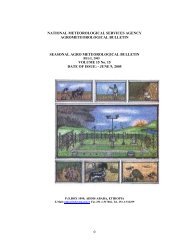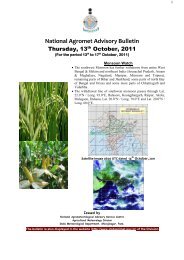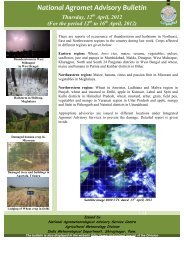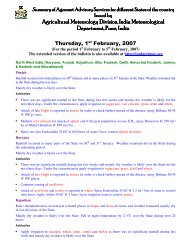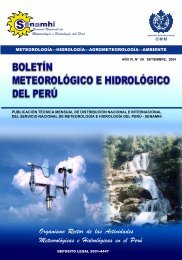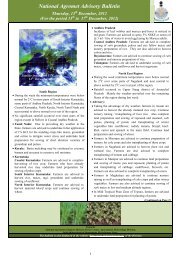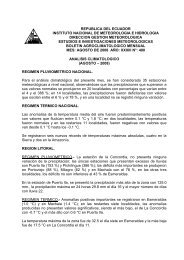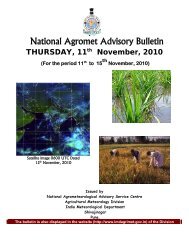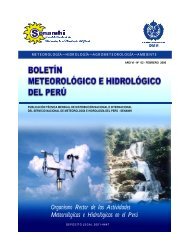Create successful ePaper yourself
Turn your PDF publications into a flip-book with our unique Google optimized e-Paper software.
irrigation & drip irrigation and spread the crop residues on the soil for minimizing moisture loss. Farmers are<br />
also advised to undertake propping in sugarcane and support for banana for preventing the damage due to winds<br />
with high speed.<br />
‣ Farmers in the High Rainfall Zone of Tamil Nadu are advised to undertake basin preparation for pepper, clove,<br />
nutmeg and cinnamon for better rain water harvest and grafting and cutting of horticultural crops.<br />
‣ Water levels in the reservoirs are very low due to lack of inflows. Hence farmers in the Southern Telangana<br />
Rainfall Zone of Andhra Pradesh are advised to avoid cultivation of rice crop under bore wells, not to raise the<br />
rice nurseries, either raise the nurseries or adopt the direct seeding in puddled soil, after receipt of sufficient<br />
rainfall and start of inflows into the reservoirs. Wherever tanks are filled with sufficient water due to recent<br />
rains, farmers can go for direct of seeding of rice under puddled conditions using drum seeder or can take up<br />
nursery sowings sparsely, so as to get quick growth with short duration varieties for transplanting.<br />
‣ Farmers in the North Coastal Zone of Andhra Pradesh are advised to drain out excess water from green gram<br />
and black gram field, as there is forecast for rain during the ensuing five days.<br />
‣ Farmers in the Krishna Godavari Zone of Andhra Pradesh are advised to continue sowing of medium duration<br />
varieties of rice, pulses, cotton, maize and vegetables utilising the recent rainfall.<br />
‣ Farmers in the Northern Telangana Zone of Andhra Pradesh are advised to sow cotton, soyabean, green gram,<br />
black gram, sunflower and castor, as sufficient rainfall has occurred during last week.<br />
‣ Farmers in the High Altitude Zone of Kerala are advised to sow short duration varieties of paddy, make a<br />
decision on area to be sown based on water availability and cultivate drought tolerant varieties to cope up the<br />
shortage of rainfall.<br />
‣ The low rainfall condition in the Problem Area Zone of Kerala results in building up of soil acidity and excess<br />
iron, making the soil acidic. Farmers are advised to undertake proper water management by flushing in and<br />
draining out of fresh water once in a week, which in turn enhances tillering. Wherever bronzing is noticed,<br />
farmers are advised to verify the root health and undertake proper weed management to control weed<br />
infestation.<br />
‣ Farmers in the Southern Zone of Kerala are advised to apply second dose of fertilizer for paddy crop planted in<br />
May, ensure proper drainage in coconut garden, complete propping in banana by month end and take care of<br />
tapping panels in rain guarded rubber plants.<br />
‣ Due to continuous rain and decrease in temperature, rust disease in soyabean and stem fly in green gram /black<br />
gram was noticed in the North East Transition Zone of Karnataka. Farmers are advised spray Propiconozole or<br />
Hexaconozole 1 ml per liter of water to control rust disease and Imidachlorprid @ 0.3 ml per litre of water to<br />
control sucking pests and undertake plant protection measures.<br />
‣ Stem borer incidence in kuruvai paddy and early shoot borer incidence in sugarcane is noticed in the Cauvery<br />
Delta Zone of Tamil Nadu. Farmers are advised to place pheromone traps and spray Profenophos at 400 ml/acre<br />
(or) apply Cartap hydrochloride 4 G @ 6 kg/ac for effective control of stem borer and Chlorpyriphos at 400 ml/<br />
acre to control early shoot borer.<br />
‣ Fruit borer incidence in tomato and brinjal and borer in bhendi is noticed in the Southern Zone of Tamil Nadu.<br />
Farmers are advised to use pheromone trap or light trap 12 nos. / ha and spray chlorphyriphos 800 ml / ha to<br />
control them.<br />
‣ Farmers in the High Rainfall Zone of Tamil Nadu are advised to undertake combined application of systemic<br />
and contact fungicides on banana to restrict the spreading of diseases.<br />
‣ Incidence of stem borer is noticed in maize and the borers caused dead hearts in early stages of the crop, early<br />
shoot borer is noticed in sugarcane, mites and shoot and fruit borer is noticed in brinjal in the Northern<br />
Telangana Zone of Andhra Pradesh. Farmers are advised to undertake plant protection measures.<br />
‣ Prevailing dry conditions are favourable for incidence of leaf miner/ leaf webber in groundnut, thrips in cotton<br />
and semilooper in castor in the Scarce Rainfall Zone of Andhra Pradesh. Farmers are advised to undertake plant<br />
protection measures.<br />
‣ In Southern Telangana Zone of Andhra Pradesh, delayed sowing of paddy nurseries and transplantings will<br />
result in gall midge incidence. Hence farmers should select gall midge resistant varieties or go for application of<br />
Carbofuran granules @ 10 kg per acre or phorate @ 5 kg per acre at 10-15 days after transplanting to control<br />
gall midge incidence. Incidence of fruit fly is noticed in gourds. Farmers are advised to keep poison bait (100<br />
ml Malathion + 100 g Jaggery per litre of water) to control it and monitor the incidence of brown spot in rice<br />
nurseries and sucking pests in cotton and vegetables.<br />
‣ Incidence of sucking pest is noticed in black gram, green gram and vegetables in the Krishna Godavari Zone of<br />
Andhra Pradesh. Farmers are advised to undertake plant protection measures on a non-rainy day.<br />
‣ Incidences of case worm, stem borer and gall midge is noticed in rice fields in the Problem Area Zone of Kerala.<br />
Farmers are advised to keep regular watch over the fields and if the attack is found, they are advised to drain off<br />
16



